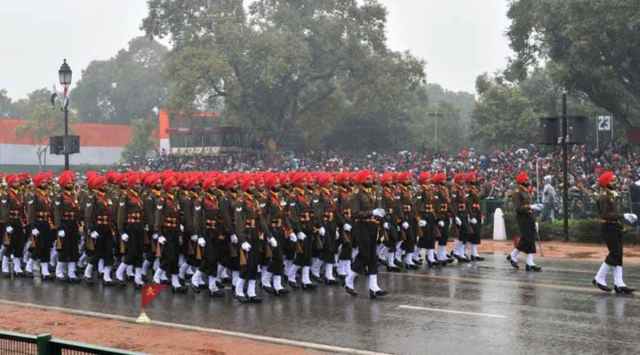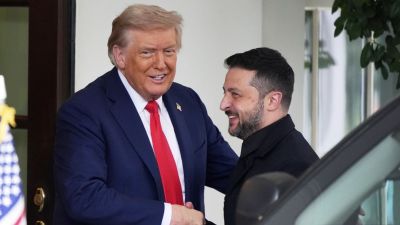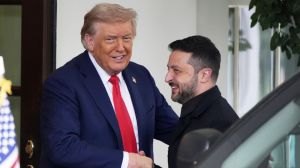Stay updated with the latest - Click here to follow us on Instagram
After more than 100 years, turban vs helmet debate for Sikh soldiers back to square one
British Sikh soldiers’ love for turban helped the community to get an exemption from wearing helmets on the road in England.
 The Sikh Regiment marching contingents passes through the Rajpath during the 66th Republic Day Parade 2015, in New Delhi on January 26, 2015. (Source: PIB)
The Sikh Regiment marching contingents passes through the Rajpath during the 66th Republic Day Parade 2015, in New Delhi on January 26, 2015. (Source: PIB) The Indian Army’s proposed induction of helmets for Sikh soldiers has once again brought to the fore the contentious issue of alleged discrimination the Sikh community has had to face over the practice of wearing turbans.
The Jathedar of Akal Takht Giani Harpreet Singh Thursday criticised the Army’s move saying it must be reconsidered and that it is an attack on the identity of Sikhs.
The Jathedar said he had learnt from news reports about the Army’s move to purchase helmets for Sikh soldiers and said the Sikh Panth and Sikh organisations would not tolerate it as the Sikhs are prohibited by the tenets of their religion to wear caps or helmets.
The debate over the use of helmets is not new for the Sikh community. In fact, Chief Khalsa Diwan, the central organisation of various Singh Sabhas spread across Punjab, had recommended Sikh soldiers in the British Indian army to wear helmets during the First World War. However, such advocacy did not change the mind of the Sikh men on the ground.
“15 Ludhiana Sikh was the first platoon that had gone to war on German fronts in October 1914. When they were sent to German frontline trenches, they were asked to wear helmets. It was there when the Sikh soldiers refused to wear helmets for the first time. There were a few other such incidents also. But then the British army had passed the order that Sikh soldiers cannot be forced to wear helmets,” said Brigadier Indra Jit Singh Gathal.
The British were consistent in pressurising Sikh soldiers to wear helmets and managed to soften even the Shiromani Gurdwara Parbandhak committee leadership over this issue, however, Sikh soldiers again fought the Second World War in turbans only.
In fact, the commitment of Sikh soldiers towards turban helped the community to get an exemption from wearing helmets while driving two-wheelers in England.
In November 1976, the Queen gave her royal assent to a Bill to exempt turbaned Sikhs from having to wear crash helmets when riding a motorcycle. The long debate on the bill touched on many aspects, including safety, brave acts of Sikh soldiers in the World Wars, the effect of helmets on employment opportunities for Sikhs and tolerance in British society.
British Sikh MP Sydney Singh Bidwell played the main role to get the bill passed. “On the one hand, there is the whole British-Sikh military tradition, whereby in times of war the Sikh proudly wore his long hair and turban to go with it. I have a letter from a former general telling me all about his experiences. He has known of a Sikh plucking bullets out of his hair and turban, and no one ever thought of trying to enforce a situation where he had to wear any other kind of headgear. There is a rich British-Sikh military tradition,” Sydney Singh Bidwell had said in his opening remarks to table the bill.
“It is not surprising that that tradition is being carried on in the British Armed Forces. No Sikh in the Navy -I am talking of devout Sikhs – in the Army or the Royal Air Force is obliged to wear the same kind of headgear as that worn by other serving men. The other prong to the argument is that in Britain we pride ourselves on religious toleration. In fact, I go so far as to say that without that tolerance, we should be lesser people,” he had said.
Lord Mowbray and Stourton, while debating in favour of the bill, had said, “On July 4, 1915, a Sikh Regiment went into the battle at Gallipoli with 10 officers and 700 men. At the end of the day, two officers and 70 men survived. During the Second World War 1,12,000 volunteered, and that does not include the substantial numbers who were already serving in the Indian Army before 1939. These men in many cases crossed two continents in order to fight and, if need be, to die in a war with whose causes and aims they were by no means intimately involved. Why did they do so? I would submit that they found that the British Empire provided them with scope and inspiration, and a fuller outlet for their energies than many recent accounts of imperial history would have us believe.”
They said, “As long as we do this we will acknowledge an undying debt to the Sikh people, to whom we are bound by the most sacred of ties, in that some of our best young men died on the same battlefields in the same fight. These are ties and debts that we must remember when we consider race relations.”
General Sir Reginald Arthur Savory took part as a subaltern at the Gallipoli engagement and was quoted in the Parliament saying, “In our hour of need, we did not press the matter of headgear on the Sikhs.”
MP Earl Gray said, “When World War II was declared, a military order was issued stating that every soldier in the Indian Army should wear a steel helmet. The Sikhs refused to fight if they were compelled to comply with that, and the order was later withdrawn in their favour. There are a number of letters from commanding officers highly commending the Sikhs in battle, and I will illustrate this with some extracts to show that the many yards of cloth wound around the head of the Sikh give effective protection.”
Colonel Hughes, who commanded a Punjab regiment, wrote, “The Sikhs all wore the head-dress and there were no more head injuries in the battalion than in any other battalion wearing steel helmets.”
This debate over the bill led to the exemption of the Sikh community from helmets on road and was a feather in the cap in the fight by Sikhs across the world to win respect for the turban that they enjoyed in Punjab. However, it did not end discrimination due to the turban.
Turban made it easy for killers to identify Sikh men and kill them in many Indian cities after the murder of then prime minister Indira Gandhi in 1984. Sikhs with turbans faced racial attacks in the US after 9/11 as they were mistaken as Muslims. France put a ban on the turban in schools in 2004 and the community is still fighting to remove this ban.
Sikhs have faced harassment at the airports and during flights due to turban. Not only ordinary Sikhs, now Union minister and then Indian diplomat Hardeep Puri faced a similar situation in 2010 when he was briefly held up at a US airport after he refused to be frisked.







